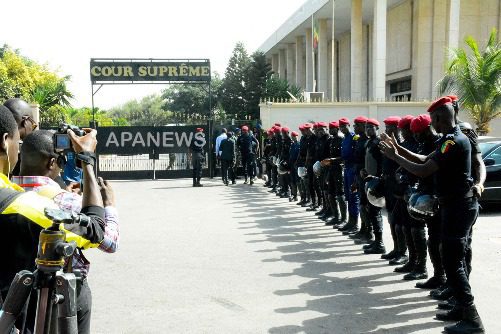“The Court dismisses the appeals brought by Khalifa Ababacar Sall, his co-accused Yaya Bodian, Fatou Traoré and the City of Dakar against Judgment No. 454 of 30 August 2018 of the Court of Appeal of Dakar and orders them to pay the costs,” the President of the Supreme Court, Amadou Baal, declared.
The apex court “declare the appeals inadmissible”.
Khalifa Sall is one of the five presidential candidates whose sponsorship file was validated by the Constitutional Council.
One of the main opponents of President Macky Sall in the presidential election slated for February 24, Khalifa Sall is facing his third judicial setback in the so-called Dakar City Hall advance fund case.
This new setback could deprive him of partaking in the presidential election, under Senegal’s penal code.
According to observers and pundits, the final confirmation of the conviction of the former mayor of Dakar would effectively place a seal of denial on his civil rights.
Consequently, his lawyers plan to introduce a “rabat d’arrêt,” a legal provision that allows them to once again take the matter to the Supreme Court based on a claim of “formal defects”.
In any case, Khalifa Sall, who has been in prison for almost two years, remains in the running for next presidential election until his appeals have been exhausted before the Senegalese courts.
The former mayor of Dakar conviction by the lower court was on December 20 upheld by the Court of Appeal, for “fraud involving public funds” and “forgery and the use of forged documents.”
The Senegalese state had prosecuted Khalifa Sall, accusing him of having withdrawn an amount of 1.8 billion CFA francs from the Dakar City Hall Advance Fund.
Khalifa Sall has always denied this, arguing that he had “political funds” at his disposal, which traditionally he was eligible to spend at his discretion.
Meanwhile, Ousmane Sonko, president of the PASTEF-Patriots party, has described Khalifa Sall’s prosecution as a “sign of a disruption” of Senegalese institutions.
“As we have said before, the trial of Khalifa Ababacar Sall is a political trial, a sign of a disruption of our institutions with a single objective – for Macky Sall to exclude a potentially very serious political opponent from the electoral competition,” Sonko said in a statement seen by APA.
“The handling of this case raised suspicions of interference and created an environment of unease with all the institutions of the Republic and, in particular, in the judicial system to the detriment of many judges who are doing their job properly.
“Never in Senegal’s judicial history has there been such a disturbing coincidence between a political agenda and a judicial calendar. Never in Senegal’s judicial history has our country been so disowned by international justice. Never in the judicial history of Senegal has such speed been observed in the handling of a case,” continued Sonko, a member of Senegal’s National Assembly following his first participation in an election.
“From the investigation of the case to the trial phase in the court of first instance; the appeal and cassation trial on December 20, 2018 to the verdict of January 3, 2019 (at the Supreme Court), as well as the lifting of the parliamentary immunity of the Honourable Khalifa Ababacar Sall, things went at a meteoric pace unprecedented in the judicial and parliamentary annals”.
Khalifa Sall’s participation in the presidential election must be “a democratic requirement of the people,” he added.
Sonko went on: “We have committed, once elected, to refrain from any interference by the Executive branch in the handling of judicial matters, which has resulted in a cumbersome presence at the head of the High Council of the Judiciary”.


